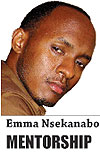Mentoring is a tool that organizations can use to nurture and grow their people. It can be an informal practice or a formal program. Mentors demonstrate, explain and model. Unfortunately, the culture of mentorship is very minimal in Rwanda. The exact description of what is happening is like abandoning a learner in the pool’s deep-end. Many senior managers in our institutions tend to throw officers or junior managers on desks and care less about their professional growth.


Mentoring is a tool that organizations can use to nurture and grow their people. It can be an informal practice or a formal program. Mentors demonstrate, explain and model.
Unfortunately, the culture of mentorship is very minimal in Rwanda. The exact description of what is happening is like abandoning a learner in the pool’s deep-end.
Many senior managers in our institutions tend to throw officers or junior managers on desks and care less about their professional growth.
This is wrong because institutional performance must be long-term oriented that hinges on process, people and time.
Here’s an anecdote that will help me to communicate my argument more lucidly. Once upon a time, there was Mr. Z and Mr. X in village Y that suffered a critical shortage of water.
Both men identified the problem as a business opportunity and agreed to venture into it. But their approaches were poles apart. Mr. Z opted for a short term strategy and his friend, X, picked a long-term plan.
Mr. Z employed a number of people and contracted them to carry water on their heads from a village that had access to water to his village Y. He immediately made good profits from people who used to come and buy water in his 20-liter jerry cans.
Mr. X deployed water pipes that brought water closer to the people in the village. The installation and resource mobilization perceptibly took much time as opposed to Mr. Y’s approach. Mr. Z focused more on delivering immediately rather than creating a sustainable business.
His business subsequently disappeared as soon as Mr. X launched his business in which he invested adequate time in its creation.
The two gentlemen were both brilliant in terms identifying a viable business. But they differed completely in terms of understanding how to juggle time in a process to form a business pegged on sustainability.
As reflected in the above anecdote, a person with expertise in the areas of need in our institutions tend to think that mentorship is wastage of time, and instead focus on their direct individual performance. It’s not about you delivering on your personal goals.
It’s about you helping all people around you to deliver on the institutional goals. You can hardly – in our institutions - come across a supportive relationship established between two individuals where knowledge, skills, and experience are shared.
We need to establish this culture where the novice is given an opportunity to seek guidance in developing specific competencies, self-awareness, and skills in early intervention.
We need the senior managers to be able and willing to share their wisdom in a nurturing way.
Through reflection and collaboration between the mentor-nivice pair, the novice can become more self-confident and competent in their integration and application of the knowledge and skills gained in the mentorship.
Our typical manager will in first days throw a document to his or her subordinate for reviewing or something. Due to inexperience and narrow base of knowledge, the results might not be the best or match the manager’s expectations.
Instead of giving a hand to this poor young boy or girl, she or he will instead be seen as an incompetent person.
Just as the words "Customer Care” has become fashionable in Rwanda, the word "Mentorship” should take a similar course. Let’s not let the swimming novices learn to swim in the deep end. They will drown and we lose them.
Emma Nsekanabo works for the Rwanda Development Board


